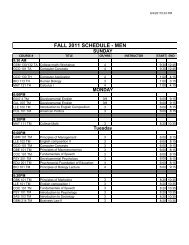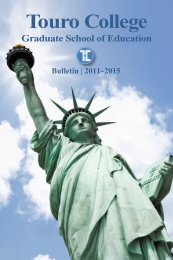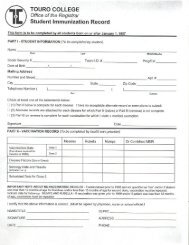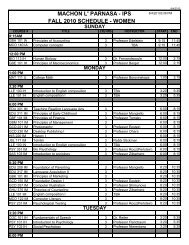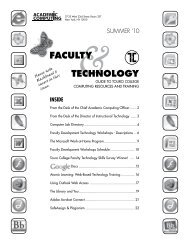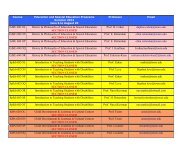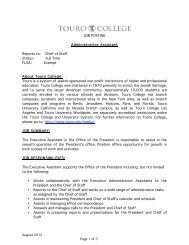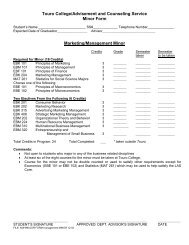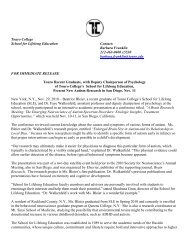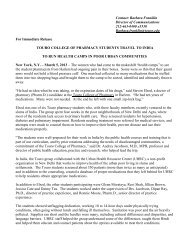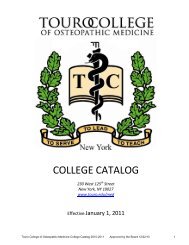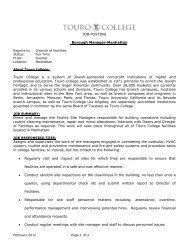Making the World a Better Place - Touro College
Making the World a Better Place - Touro College
Making the World a Better Place - Touro College
Create successful ePaper yourself
Turn your PDF publications into a flip-book with our unique Google optimized e-Paper software.
that to really be effective, we have to address<br />
multiple audiences about this problem.”<br />
The most important relationships, though,<br />
are <strong>the</strong> ones with students in high schools.<br />
Dr. Kovera says, “Ideally, students will begin<br />
to open up to us as well as to <strong>the</strong>ir teachers<br />
and guidance counselors.”<br />
They are also seeking to recruit and train<br />
“ambassadors”—high school students who<br />
want to take leadership positions in combating<br />
this public health issue. Dr.<br />
Kovera says that as <strong>the</strong><br />
program develops, <strong>the</strong> <strong>Touro</strong><br />
team will begin to measure <strong>the</strong><br />
ambassadors’ levels of selfefficacy<br />
and <strong>the</strong> inroads <strong>the</strong>y<br />
make toward promoting <strong>the</strong><br />
anti-drug abuse message with<br />
<strong>the</strong>ir peers.<br />
For Dr. Kovera, <strong>the</strong> best<br />
outcome would be getting<br />
feedback from a student who<br />
– Dr. Craig Kovera, Department of<br />
was in peril. “If a student<br />
Pharmacy and Health Outcomes<br />
comes back and says, ‘You<br />
really helped me,’ I can’t think<br />
of a better result.”<br />
Though Sandy affected program activity in<br />
Tottenville, which was turned into a shelter<br />
post-storm, <strong>the</strong> <strong>Touro</strong> volunteers are eager to<br />
“<strong>Touro</strong> students are role<br />
models for high school<br />
students. These are<br />
motivated students<br />
who really want to<br />
participate in community<br />
interventions.”<br />
get back to work, and have been contacting<br />
<strong>the</strong> schools to arrange events. They’re also<br />
exploring ways to raise awareness by<br />
partnering with hospitals. Since <strong>the</strong> program<br />
is new, <strong>the</strong> <strong>Touro</strong> students are also creating<br />
a living archive, with detailed records<br />
conveying <strong>the</strong> exchanges between high<br />
school students and <strong>Touro</strong> students.<br />
Now in its second year, <strong>the</strong> program has<br />
attracted great interest from <strong>Touro</strong> students,<br />
with approximately 55 students expressing<br />
interest for approximately 20 available<br />
volunteer spots. An added benefit is that <strong>the</strong><br />
<strong>Touro</strong> students are role models for high<br />
school students who might be interested in<br />
pursuing careers in public health. Dr. Kovera<br />
says of <strong>the</strong> <strong>Touro</strong> volunteers, “These are<br />
motivated students who really want to<br />
participate in community interventions.”<br />
As <strong>the</strong> program develops, Patel is<br />
thoughtful about <strong>the</strong> effect this work has on<br />
<strong>the</strong> students. “If, in every educational<br />
meeting, we have at least one student who<br />
decides to stop abusing prescription drugs,<br />
or realizes that ‘I can guide my friends who<br />
are abusing’ or at least retains <strong>the</strong> message<br />
that prescription drug abuse is harmful, that<br />
would definitely be very beneficial and<br />
meaningful.” n<br />
30 TOURO LINKS I SPRING 2013



